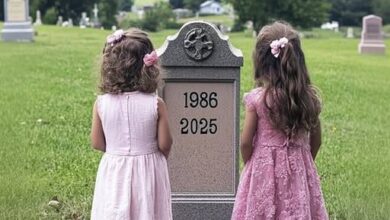
Wifes Poignant Post Shared Just Before Tragedy!
Hours before tragedy struck, Erika Kirk shared a brief message of faith on social media. At the time, it was a quiet reflection, the kind of post she often made to ground herself in the values she and her husband built their lives upon. But in hindsight, her words feel haunting, almost prophetic. They carried an ordinary reminder of strength and refuge, written without any sense of what was about to unfold. By the evening, Erika would find herself widowed, her two small children fatherless, and a nation grappling with the shocking assassination of Charlie Kirk.
Charlie, just 31 years old, had become one of the most prominent young voices in American conservatism. As the co-founder of Turning Point USA, he had built a reputation as a sharp debater and tireless activist, someone who thrived on sparking conversation and drawing crowds of young supporters. His appearances on college campuses often generated both admiration and protest, a testament to how polarizing and influential he had become. That tension came to a devastating end on September 10, 2025, at Utah Valley University.
Kirk had been addressing students in a Q&A session when gunfire rang out. Witnesses say the moment was surreal—confusion spreading as attendees ducked for cover, unsure where the shots had come from. The bullet struck him in the neck, and though medical personnel rushed to intervene, his injuries were fatal. He was pronounced dead shortly afterward, leaving behind a stunned audience and a family that would never be the same.
Investigators later confirmed that the shots were fired from a nearby building, underscoring the chilling reality of political violence in America. It was not the first time a controversial figure had faced threats, but it was one of the rare occasions when those threats turned deadly. The attack left students and staff shaken, many recounting the disbelief of witnessing violence at what was supposed to be a spirited but peaceful event.
For Erika, the loss was deeply personal, cutting short a partnership she and Charlie had been building since they married four years earlier. The couple had recently celebrated their anniversary, marking milestones not only in their marriage but also in raising two young children together—a daughter and a son. Their life was a blend of faith, activism, and family, shaped by long hours on the road for Charlie and an unwavering commitment to values they both held dear. Friends often described them as a team: he in the public spotlight, she offering the quiet strength that steadied him.
Her message, posted only hours before the shooting, has since been shared tens of thousands of times. It is now seen less as an ordinary note of encouragement and more as a poignant reminder of the fragility of life. To many, it encapsulated the faith that Erika has leaned on in this devastating moment. Supporters across the political spectrum pointed to it as evidence of resilience, a symbol of how even in unimaginable pain, she clings to the beliefs that have always defined her.
In the days after Charlie’s death, tributes poured in from allies, opponents, and ordinary citizens alike. Supporters highlighted his energy and ability to inspire young people, recalling the countless rallies, campus visits, and media appearances that had marked his career. Even critics who had sparred with him politically acknowledged the tragedy of his loss, offering condolences to his family and condemning the violence that took his life.
Public figures quickly joined the chorus of grief. Former President Donald Trump described Charlie as “a warrior for the truth” and pledged to honor his legacy at the upcoming funeral. He also announced that Kirk would receive the Presidential Medal of Freedom posthumously, calling it an obligation to recognize a life cut short in the service of ideals. Vice President JD Vance referred to him as a friend, praising his generosity and devotion to faith and family. Across social media, hashtags bearing Kirk’s name trended for days, filled with clips of his debates, photos of him with supporters, and prayers for Erika and the children.
Yet amid the national outpouring, Erika’s role has quietly taken center stage. Friends describe her as steadfast, even in grief, carrying herself with a calm that speaks to years of unshakable belief. Those close to her say that faith has always been her compass, and now, as she navigates the unthinkable, it is what allows her to keep moving forward. Her post before the tragedy has been held up as a symbol of that strength—a snapshot of a woman who, even unknowingly, prepared herself for the storm that was about to come.
The assassination has reignited a broader conversation about the risks faced by public figures, especially those as polarizing as Kirk. Questions about security at campus events, the role of online radicalization, and the heated rhetoric of modern politics have taken on renewed urgency. Many fear that the attack could mark a dangerous escalation, further fueling division in a country already deeply fractured. For some, Erika’s message serves as a reminder of what gets lost in the noise: behind every public figure is a family, and behind every debate, real human lives are at stake.
As preparations for Charlie’s funeral unfold, the image of Erika—head bowed, rosary in hand, children by her side—has already become iconic. It represents not only her personal grief but also the shared mourning of a community struggling to make sense of violence in its most personal form. She has chosen not to speak at length publicly, letting her earlier words stand as both her final message before tragedy and her guiding principle afterward.
The Kirks’ story, once a narrative of ambition and activism, has now become a story of resilience. Erika’s quiet strength has inspired countless others who see in her not just the widow of a public figure but a mother determined to hold her family together in the darkest of times. Friends and colleagues say she remains focused on her children, determined that their father’s legacy will be remembered not only in politics but in the personal values he lived by at home.
Charlie Kirk’s life was polarizing, but his death has, at least briefly, united people across divides in shared grief. His influence on young conservatives will continue to be debated, his strategies critiqued, his impact measured. But Erika’s simple post before tragedy has transcended politics. It has become a touchstone for many, a reminder that life can change in an instant, and that faith, however expressed, can be both anchor and witness in moments of despair.
For the nation, Charlie’s death may be seen as another flashpoint in a turbulent era. For Erika, it is the loss of a husband, the father of her children, and the partner she built a life with. And for those who have followed the story, it is a sobering lesson about the fragility of life and the power of words that, even unintentionally, can echo louder than we ever imagine.




